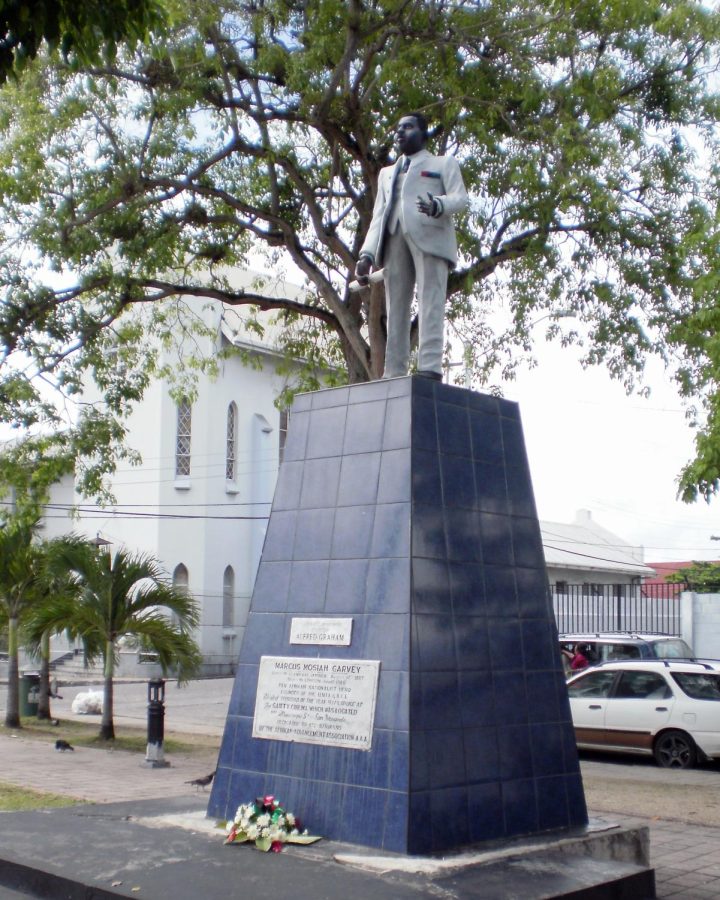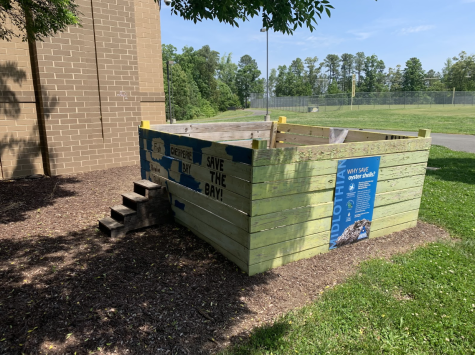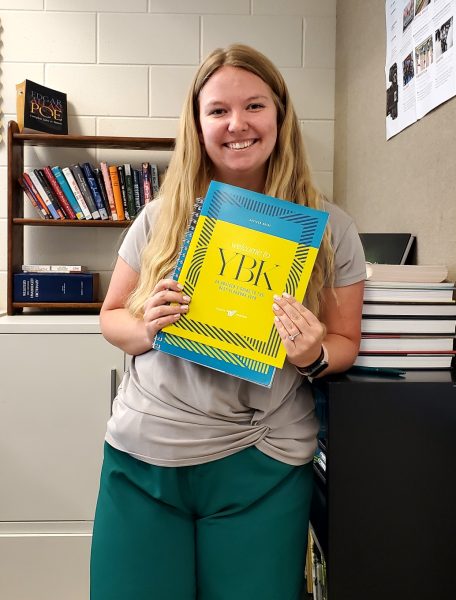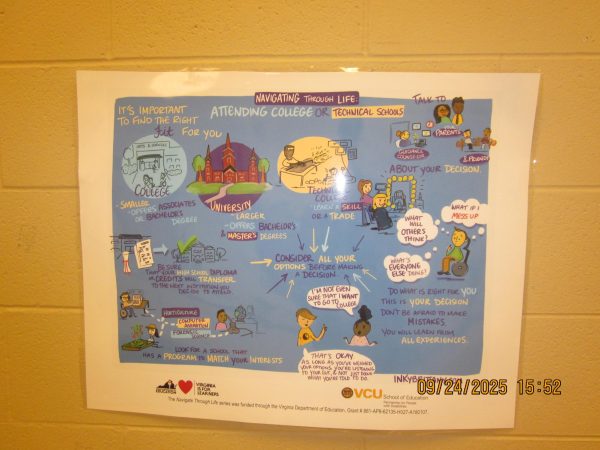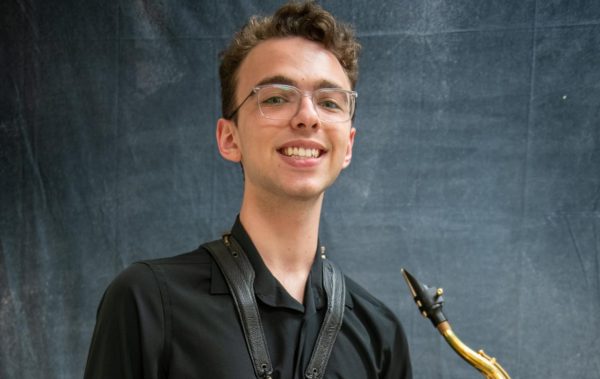Black History Month spotlight: a history of Black activists
Memorial of Marcus Garvey situated at Harris Promenade, San Fernando, Trinidad and Tobago.
This article is the fifth in a five part article series that will feature famous historical black figures for the month of February. This week’s feature will deal with numerous Black activists who worked to shape civil rights in the mid 20th century.
Throughout the mid 1900s, numerous civil rights leaders inspired a cultural, political and ideological change within the country. Amongst the more popular of these figures, such as Dr. Martin Luther King Jr. or Rosa Parks, is a world full of powerful activists who have shaped a significant part of American culture and governmental systems.
Marcus Garvey
Marcus Moziah Garvey was a Jamaican political activist and founder of the Universal Negro Improvement Association (UNIA). Garvey was born on Aug. 17, 1887. He went to school in Jamaica until he was 14, after which he began traveling around central America and lived in London for two years. When he returned to Jamaica, he and a group of friends founded the UNIA on Aug. 1, 1914.
The UNIA’s initial, general goal was to build a Black-governed nation within Africa. Following his return to Jamaica, he went to the United States to gain more followers after a failed attempt to garner support from Jamaica. By 1919, Garvey founded multiple branches within Harlem and other notable neighborhoods around the northern United States, eventually amassing about two million followers of the UNIA.
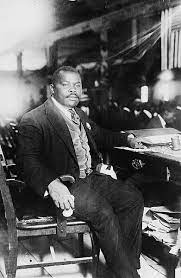
He inspired his followers through Black empowerment. He taught about African history, powerful Black leaders through the decades and the successes and accomplishments of Africans. He would often talk about the possibility of all Black individuals around the world being proud of being Black, as opposed to living in relative shame and obscurity due to the white world around them. He would preach about establishing an independent Black economy, which would lead to an independent Black nation in Africa. To make progress on this ambitious goal, Garvey and the UNIA opened plenty of grocery stores, restaurants, a printing press, a hotel, a shipping line and built factories within the industrial United States.
The UNIA has since inspired millions and moved many Black activists throughout the 1900s looking for change, including Malcolm X, many members of the Nation of Islam, the Black Power movement and the Rastafari movement in Jamaica.
Huey P. Newton, Bobby Seale, & The Black Panthers
Huey P. Newton was born on Feb. 17, 1942 in Monroe, Louisiana. He and his family moved to Oakland, California where he would spend most of his life. During college, he met Bobby Seale, born Oct. 22, 1936 in Dallas, Texas. Together they founded the Black Panther Party, a militant organization of mostly young African Americans set out to demand reparations for Black people for centuries of harmful exploitation. Founded in 1966, the Black Panthers started out as a protective group stationed in Black neighborhoods to protect innocent Black people from police brutality. Within the next decade, Huey P. Newton, Bobby Seale and the Panthers would contribute to a generation of change, bringing about a long-awaited shift in culture and improvement in political structures.
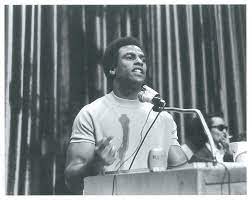
(Creative Commons)
The Black Panther party was founded as a result of the ongoing “Black Power” movement, a term coined by Kwame Ture, a leader of Black nationalism within the United States and a fellow member of the Party for a short amount of time. The Party evolved to adopt an ideology of resistance against oppression as opposed to simply living through it. This practice of using more violent methods of resistance was directly contradictory to the ongoing peaceful civil rights movement of the time. Despite this, the Black Panther Party movement brought Black people together through different means and were able to protect each other from the struggles of oppression.
As the years passed, many free programs dedicated to providing support for poor Black people would grab the attention and support from many people, eventually leading to dozens of chapters of the party being established throughout many cities in the country. The most prominent and successful of these programs was the Free Breakfast For School Children program, which sought to provide for children who could not afford breakfast in the morning. Eventually, infighting within the party, CIA and FBI interference and the assassination of numerous party leaders lead to the ultimate demise of the Black Panthers. Records of the party’s history as well as the lives of the leaders can be found through Huey P. Newton’s autobiographies “Revolutionary Suicide” and “War Against The Panthers,” and Bobby Seale’s autobiography “A Lonely Rage.”
Fredrick Hampton
Fredrick Allen Hampton, born on Aug. 30, 1948 in Summit, Illinois was the leader of the Illinois chapter of the aforementioned Black Panther Party, stationed in Chicago, IL. His contributions to the Party were so impactful and harmful to the traditional systems of the United States government that the FBI deemed him as a domestic threat, placing him on the top of their hit list. This would lead to him leading a short life, being assassinated at only 21 years old on Dec. 4, 1969.
Hampton was a powerful speaker who was able to mobilize the whole city of Chicago in order to make change in society. His speeches were monumental and moving for the oppressed, even inspiring people from other backgrounds to contribute to the Panthers. He was a key figure for establishing the Free Breakfast program which would spread across the country. The most stunning feats Hampton was able to accomplish was organizing peace pacts between rival groups and gangs in Chicago.
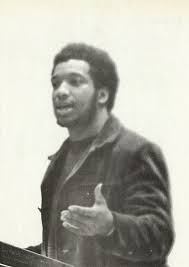
Eight months before his death, Hampton established the Rainbow Coalition, an antiracist, socialist movement in Chicago. The movement was an allyship between multiple groups of people from separate backgrounds experiencing poverty and systemic oppression. The participating groups would protect each other during rallies, protests and strikes, as well as fight hand in hand against police brutality, substandard housing and racism. The Coalition also brought exposure to the aspect of the Black Panther Party that fought for LGBTQ+ rights, which was striking for the time.
As promising as this movement seemed, it would meet its ultimate demise following the assassination of its young leader Fred Hampton. It would be rehashed into the Rainbow/PUSH nonprofit organization founded by Jesse Jackson, who represented the Black Panther Party following Hampton’s death. Rainbow/PUSH persists even today, and is a remnant of the ideas and impact which Hampton left after his death. The coalition still lives on this way, and provides support for the same disadvantaged communities as Fred Hampton, Huey P. Newton, Bobby Seale and the Black Panthers fought for more than half a century ago.
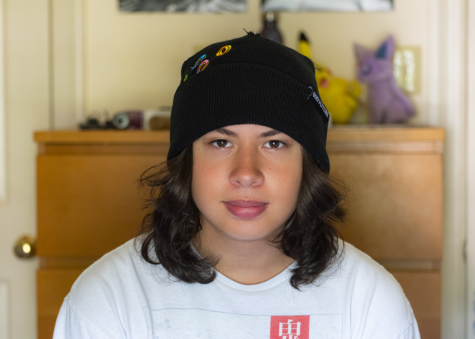
Levi Xayachack is a first year writer for the Cavalier Chronicle, and is a senior at Clover Hill High School. Their interest in all of the arts as well...


